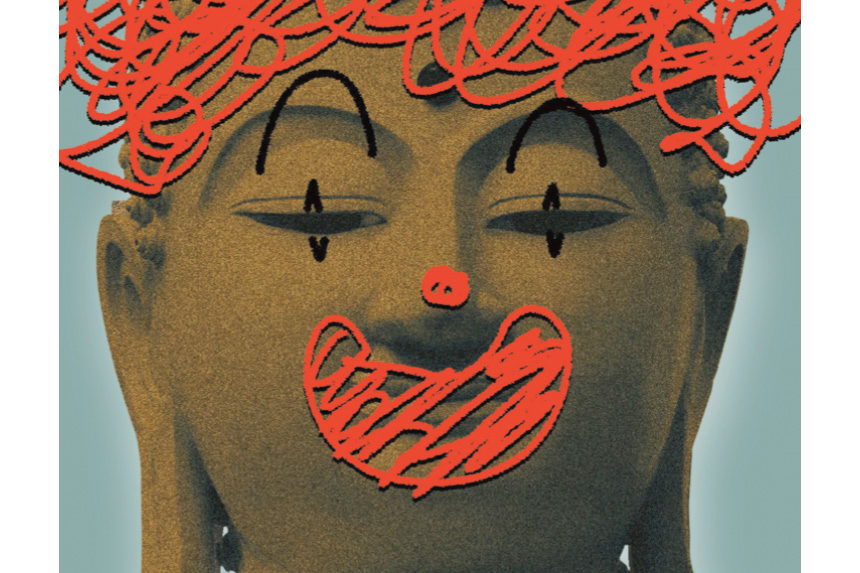You leave work late and drive home in rush-hour traffic, listening to a podcast with a climate scientist explaining the gloom-and-doom scenario that awaits us all. When the traffic jam finally breaks up, you get your economy car up to speed, and — Bam! — you hit the pothole you’ve been avoiding for months, piercing a tire. When you finally make it back to the small apartment you pay too much money for, you check your mail to find a bill from your recent hospital visit just shy of your $2,000 deductible. You close yourself into a quiet room and open the Aura app on your smart phone that guides you through a focused breathing meditation to cultivate mindfulness.
Is it working?
Mindfulness, a practice taken from Buddhism, has steadily popularized as a remedy for daily stresses over the last few decades. Big CEOs, therapists, and scientists have testified for the “life-changing” results of looking inward, but some thought leaders say it’s only part of a wider trend of individualizing societal problems.
When I first spoke to Dr. Ronald Purser, he read my puzzled mind, saying “You’re probably thinking I seem awfully anti-capitalist for a management professor.” Purser, a professor of Management at the College of Business at San Francisco State University, is also an ordained Zen Dharma teacher in the Korean Zen Taego Order. He has been publishing papers on management and organizational change through Buddhist or ecological lenses for decades. His most recent book, McMindfulness, is a critique of the rising industry around the practice of mindfulness and its corporate proponents: elites cherry-picking Buddhism to offer cold comfort and reinforce individualism.
The Saturday Evening Post: What is the mindfulness movement?
Purser: It’s not a monolith, but I think, in general, we’ve seen how a therapeutic modality gradually morphed into a capitalist spiritually, as I put it. Mindfulness as a therapeutic intervention started with Jon Kabat-Zinn’s work in 1979. It initially offered an alternative intervention for chronic stress and other maladies, but for many years it was confined to hospitals and clinics. Around 2000 to 2005, it became mainstream. This whole process involved slowly growing scientific interest around mindfulness to garner legitimacy. To offer mindfulness as a medical intervention, it really had to be mystified. What I mean by that, is that the explicit connection of mindfulness practice to any kind of Buddhist sources had to be downplayed. Once it was decontextualized from a Buddhist framework — like teachings on ethics and morality, and so forth — it could gain traction in secular audiences, and then entrepreneurship kicked in.
I think it gained a lot of traction after the financial crisis of 2008 because people were overwhelmed by the stresses and anxieties they were facing. Mindfulness offered a convenient respite, a way to turn away from all of the structural and political challenges of our time.
Post: What’s wrong with people practicing mindfulness? Isn’t it a healthy habit?
Purser: There isn’t anything inherently wrong with using mindfulness to de-stress. The problem isn’t that using mindfulness for stress-reduction doesn’t work — the problem is that it does work! But work in the service of whom and for whose interests? For example, just as there is nothing wrong with treating those suffering from depression, the problem is when the diagnosis and dominant narrative is that depression is nothing but a chemical imbalance in the brain. The pharmaceutical industry has a huge financial stake in maintaining and propagating such a narrative that is based on biological reductionism.
Similarly, the mindfulness industry and its proponents have a vested interest in maintaining a narrow way of framing and explaining stress in our society, which also adheres to a reductionist focus on the individual. Whether explicitly or implicitly, it sends the wrong message that the stresses people experience are just inside their own heads, or that their external resources and social conditions don’t matter. People may find that they could be a lot less stressed if they organized around collective resources — by building community, and engaging more politically in solidarity with others in changing our political and economic systems. It’s not an either/or choice, but the mindfulness apologists have chosen the individual to the downplaying of the social and communal dimensions of mindfulness.
This is partly because mindfulness has been embedded in therapeutic culture. This is what the late critical psychologist David Smail called “magic voluntarism:” de-contextualized individuals alone are held responsible for their stress and anguish, regardless of the social and economic milieu in which their lives are embedded. And mindfulness is now a DIY technique that an isolated individual can perform in order to cope with the challenges of modernity.
Post: Is mindfulness related to positive psychology?
Purser: These self-help techniques, to me, all represent a way of rekindling individualism in our society. The neoliberal ethos is alive and well, so these methodologies don’t meet any resistance when it comes to integrating them into our culture. One of the latest fads is “grit” or “resilience,” it’s this notion that all of our success and happiness are just a matter of turning inward and finding our inner resources. They all subscribe to the idea of the autonomous individual, which is separate from the community. It’s a sort of hyper-individualistic way of legitimizing neoliberalism.
Post: Would you say we are experiencing more stress in the current time period than times past? I’m thinking particularly of the turn of the last century and the many accounts of widespread stress in this country as people moved into cities in large numbers, among the many other societal changes.
Purser: In the book, I chronicle the long history of how we got to the discourse of stress that we’re using now. At the turn of the century, there was that strange diagnosis called neurasthenia which was a bizarre diagnosis reserved primarily for upper classes. It was actually a badge of honor. They saw it as the price you had to pay for progress and industrialization. But, certainly, they were going through something. The diagnosis at the time was different than it is now, but I think there’s a parallel there. In both cases, you see the medical community coming in and overlaying the etiology, basically saying that it’s located in the individual.
But I think that we are more stressed. There are statistics on this. Workplace stress is on the rise, as are stress-related diseases. A World Health Organization study that found around $300 billion a year is lost due to stress at work. Part of my critique is that the cure places the burden of responsibility on individuals.
Post: You’re in San Francisco. What can you say about the practice of mindfulness in Silicon Valley?
Purser: It’s huge. It really took off probably around 2010. Google became a sort of poster child for corporate mindfulness with the publication of Search Inside Yourself by Chade-Meng Tan, a Google engineer. Big conferences, like Wisdom 2.0, are held every year here in San Franscisco. It’s very popular in the Valley, which has always had this kind of spiritual, libertarian character to it. Steve Jobs had a background in Zen. But it’s selectively appropriated to optimize worker engagement. They’ll say it’s a form of “brain hacking.” In the 1960s, LSD was used for consciousness expansion, but now it’s used — via “microdosing” — to become more productive. Similarly, Zen was very anti-establishment and anti-materialistic, and now it’s used as a productivity enhancement tool for corporations.
By focusing only on individual-level stress reduction, these programs don’t take into account the systemic and structural problems in the workplace that are causing the epidemic of stress in the first place. In other words, there is no critical diagnosis of workplace stressors, which are long hours, work/family conflicts, economic insecurity, and lack of health insurance. Paulo Freire, author of Pedagogy of the Oppressed, called these “aspirin practices” because they promise to make the world a better place, but they really don’t change the root causes of stress that people are feeling.
Things like mindfulness seem very benign on the surface, so it’s almost incredulous to call them into question. But the harm is more at the socio-political level, because you’re basically letting corporations off the hook for responsibility of the social pollution they’re dumping on people. It’s not a form of brainwashing, or some conspiratorial thing, but what it does do is deflect attention away from collective ways of organizing to affect structural change.
Post: Do you see any signs of a movement that addresses your criticisms of this kind of individualistic mindfulness?
Purser: There are a lot of people on the fringes thinking about this besides me. I think we’re at a point where we have to come to terms with the idea that focusing on individual psychology and individual-based interventions are just not going to do it anymore. If you look at the ecological crisis, it’s a spiritual crisis. We’re dealing with suffering on such a systemic level that just retreating into our caves is problematic. I understand the need to cope, but the form of suffering that we’re dealing with is institutionalized and collective, not just at the individual level.
I think things can turn very suddenly and unexpectedly. If I were a practitioner of mindfulness in Australia right now, I think I may start considering other approaches. We have a hard time imagining other possibilities because we’ve been subject to this imagination machine of neoliberalism for so long that it’s hard for us to consider alternatives. We might want to turn to a more creative engagement with our own prophetic traditions — like the Judeo-Christian tradition — which account for social justice and oppression. A fundamental teaching in Buddhism is interdependence with all beings and with nature. I think that part of the equation hasn’t been given enough attention.
Purser’s book, McMindfulness, was published in 2019 by Repeater Books. Purser also recommends The Mindful Elite: Mobilizing from the Inside Out by Jaime Kucinskas.
Featured image by Repeater Books
Become a Saturday Evening Post member and enjoy unlimited access. Subscribe now




Comments
Thanks for putting your finger on the problem I’d been sensing about the pervasiveness of mindfulness. I knew generally, that an explosion of ‘mindfulness’ books couldn’t be a good thing, but I was having trouble identifying why. This interview provides a definitive, reasonable answer to that question.
A really good interview Nick, where you asked the author just the right questions. Although yes, the individual needs to address their problems, the curse of their existence is often beyond the realm of their “science” or coping mechanisms as described. Nothing will really change until the institutions do and the people won’t have nearly the stress levels to have to seek out their own solutions for.